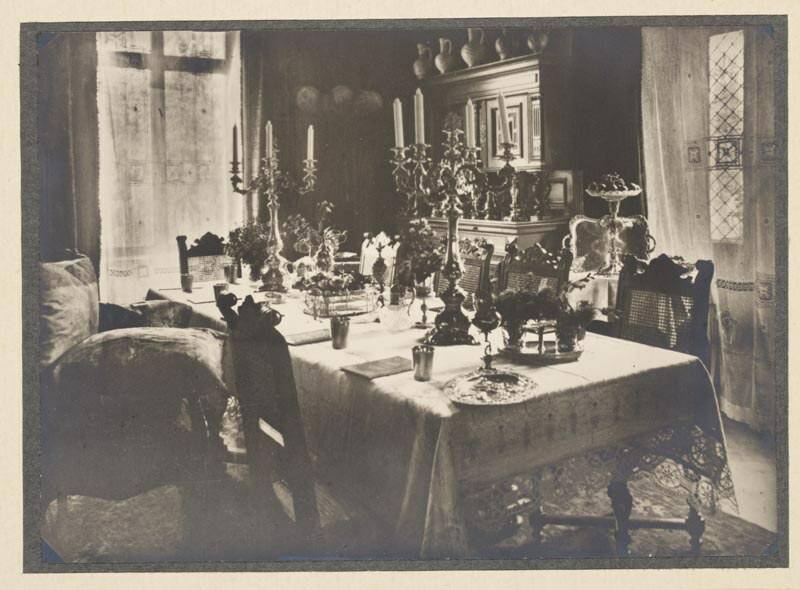Arrangement

1
Buy five pounds of dates from a discount store.
Pour boiling water on them and mash them and leave them for a while.
In the meantime put a bucket outside to catch rain or snow water.
2
Take handfuls of dates and squeeze the pulp through an old shirt while your cousins turn
the lights off and crawl around with a candle cleaning up.
Burn some of the crumbs they find and burn a corner of this piece of paper too.
Wait an hour.
3
Boil the date water and squeeze it again.
Simmer it for four nights.
Cover it with an old shirt in the sun and guard it from squirrels.
If there’s no sun sit around it with your cousins, tell jokes
and watch basketball games.
Make a mortar of the molasses.
4
Get in a large group.
Whoever leads begins by saying, Action evokes an equivalent.
5
Have the youngest adult tie a napkin over their shoulder
and walk into the room.
The oldest family member: Where did you come from?
The youngest: I don’t remember.
The oldest: What are you taking with you?
The youngest holds up the napkin.
Good.
6
Get up and walk around the house.
Don’t stop until after dark.
When you arrive where you were sit somewhere else
unless you want to be the storyteller.
7
At this point disinvite anyone at the table who has supported the war or the occupation,
even from their own home.
They can walk around outside the home three times
and reenter.
The others say, The oldest hatred I have felt is of loved ones.
The others then can welcome the warmongers to a peaceful home.
8
If no one has opposed the war or the occupation, have all the first-born present tear their
clothing and stain it.
If there are no first born present, have the oldest nominate someone.
9
Go outside and break a branch,
put the tip of the branch in your eye,
ear, nose or mouth.
10
Ask the question where that which comes after pretends to come before.
11
Have the ones who supported the war take the oldest at the table.
Have them say to the youngest, Reveal the names or we’ll do our thing.
The youngest might say one of the names, but if they don’t
then the oldest should say to them, You have proved your love
and the warmongers can say, Nothing terrifies you.
12
Imagine your ancestors where they were and accept their forgiveness.
Wash your hands in the rain and snow water from before.
Say the name of a place where your ancestors were.
Say the name of someone who has lived in your area and no longer does.
13
Go out and have a picnic or have sex.
Lay around. Read about bugs.
When you come back have the oldest person hold up a book and say,
I never do this!
and rip the book in two or rip out some pages.
14
Set the pages in a napkin and hide it in the house.
Hide them off the ground and away from dogs.
15
Remove items one by one from the table until someone asks why.
Return the items one by one and explain why.
16
Let the storyteller tell a version of the story.
17
Make a sandwich and give it to the person on your left.
18
Fill a bowl.
The bowl should have large eyes which become part of a face when it’s tilted.
Put yourself in the liquid.
Let nobody look at what spills.
Put someone else’s face in the bowl.
19
Cover your fish in jelly.
20
Discuss the relevance of frogs.
If anyone is new, the storyteller should explain the frog’s tympanum.
List different kinds of frogs starting with spring peepers.
21
Eat a meal that includes the date molasses.
After the meal have the three youngest look for the concealed pages.
Whoever finds them should bring them back,
but should resist giving them up.
Someone says, What can we offer you for these pages?
The finder should say, Twice as much as you’ve already offered.
Pay up.
22
Everyone read one of the concealed pages or imagine you have.
Everyone remember something.
23
Open the door and run toward it.
Jonathan Dubow lives in Carlisle, Pennsylvania. He has recentpoetry in Grist: A Journal of the Literary Arts, The Ilanot Review, Waccamaw and elsewhere.